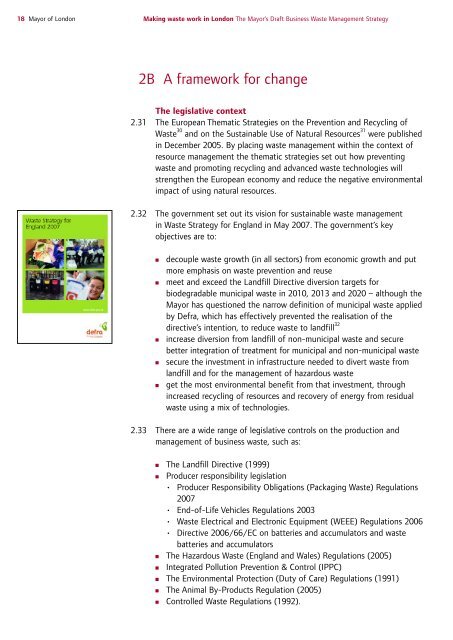Draft Business Waste Strategy PDF - london.gov.uk - Greater ...
Draft Business Waste Strategy PDF - london.gov.uk - Greater ...
Draft Business Waste Strategy PDF - london.gov.uk - Greater ...
You also want an ePaper? Increase the reach of your titles
YUMPU automatically turns print PDFs into web optimized ePapers that Google loves.
18 Mayor of London<br />
Making waste work in London The Mayor’s <strong>Draft</strong> <strong>Business</strong> <strong>Waste</strong> Management <strong>Strategy</strong><br />
2B A framework for change<br />
The legislative context<br />
2.31 The European Thematic Strategies on the Prevention and Recycling of<br />
<strong>Waste</strong> 30 and on the Sustainable Use of Natural Resources 31 were published<br />
in December 2005. By placing waste management within the context of<br />
resource management the thematic strategies set out how preventing<br />
waste and promoting recycling and advanced waste technologies will<br />
strengthen the European economy and reduce the negative environmental<br />
impact of using natural resources.<br />
2.32 The <strong>gov</strong>ernment set out its vision for sustainable waste management<br />
in <strong>Waste</strong> <strong>Strategy</strong> for England in May 2007. The <strong>gov</strong>ernment’s key<br />
objectives are to:<br />
■ decouple waste growth (in all sectors) from economic growth and put<br />
more emphasis on waste prevention and reuse<br />
■ meet and exceed the Landfill Directive diversion targets for<br />
biodegradable municipal waste in 2010, 2013 and 2020 – although the<br />
Mayor has questioned the narrow definition of municipal waste applied<br />
by Defra, which has effectively prevented the realisation of the<br />
directive’s intention, to reduce waste to landfill 32<br />
■ increase diversion from landfill of non-municipal waste and secure<br />
better integration of treatment for municipal and non-municipal waste<br />
■ secure the investment in infrastructure needed to divert waste from<br />
landfill and for the management of hazardous waste<br />
■ get the most environmental benefit from that investment, through<br />
increased recycling of resources and recovery of energy from residual<br />
waste using a mix of technologies.<br />
2.33 There are a wide range of legislative controls on the production and<br />
management of business waste, such as:<br />
■ The Landfill Directive (1999)<br />
■ Producer responsibility legislation<br />
• Producer Responsibility Obligations (Packaging <strong>Waste</strong>) Regulations<br />
2007<br />
• End-of-Life Vehicles Regulations 2003<br />
• <strong>Waste</strong> Electrical and Electronic Equipment (WEEE) Regulations 2006<br />
• Directive 2006/66/EC on batteries and accumulators and waste<br />
batteries and accumulators<br />
■ The Hazardous <strong>Waste</strong> (England and Wales) Regulations (2005)<br />
■ Integrated Pollution Prevention & Control (IPPC)<br />
■ The Environmental Protection (Duty of Care) Regulations (1991)<br />
■ The Animal By-Products Regulation (2005)<br />
■ Controlled <strong>Waste</strong> Regulations (1992).
















